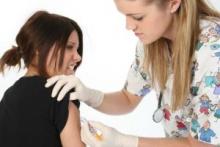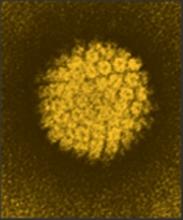The human papillomavirus vaccine was recommended for routine use in 11-12 year old girls in 2007. But by 2010, the most recent year for which data are available, less than half had received one dose of the three-dose series and fewer than a third had received all three. The inconvenience of the need for three separate office visits along with the vaccine’s price – about $130 per Gardasil dose, as of July 2011 – have certainly contributed to the low uptake.
Now, some parts of the world – including Mexico, Switzerland, and parts of Canada have moved to either a two-dose schedule, or a so-called “extended dose” schedule, in which the third dose is delayed until 5 years after the second one. (In the current U.S. three-dose schedule, doses two and three are given at 2 and 6 months, respectively, after dose one.)
“There has been emerging interest in HPV vaccine schedules with fewer than three doses, for a variety of reasons. These schedules could facilitate implementation, they may be more convenient for providers, parents, and vaccinees, and of course they would be cost-saving,” said Dr. Lauri Markowitz, of the Centers for Disease Control and Prevention, at a recent meeting of the CDC’s Advisory Committee on Immunization Practices.
No data on the efficacy of fewer than three doses have been published by either Merck or GlaxoSmithKline from their pivotal trials of Gardasil and Cervarix, respectively. But some other data are available for both vaccines. A nonrandomized study in Costa Rica that included more than 1,100 women who had received just one or two doses of Cervarix suggested that two doses or maybe even just one – could be as protective as three doses against infection at 4 years.
And in an as-yet unpublished study done in Canada, immune responses against both HPV 16 and 18 at 3 years were similar between two doses of Gardasil given at age 9-13 years and three doses given at age 16-26 years. But, there are limited efficacy data and no long-term data, Dr. Markowitz said.
In an e-mail, Deb Wambold of Merck Vaccines said that, while the company does support studies of alternative dosing schedules for HPV vaccination including two-dose regimens, so far those studies are “interesting preliminary explorations in select subpopulations of vaccinees,” and “It is important to note that there are no data on the clinical efficacy or durability of effectiveness with two doses of either of the HPV vaccines, as we have for the recommended three-dose vaccination regimen.”
Dr. Joseph A. Bocchini Jr., who chairs the ACIP HPV vaccine working group, concurred. In an interview at the ACIP meeting, he noted that the long-term efficacy of two doses is “worth looking at,” as is the varying of three-dose schedules. “But, at this point, there are too few data to apply this to recommendations in the United States.”
More data from ongoing trials will be available in the next few years, Dr. Markowitz said.
-Miriam E. Tucker (@MiriamETucker on Twitter)



